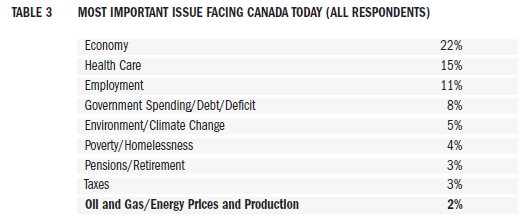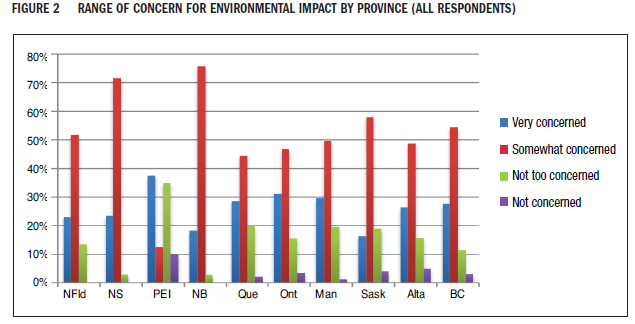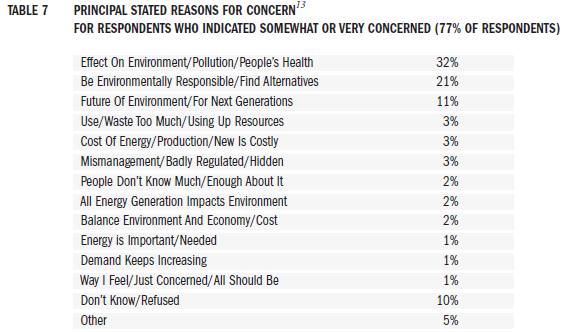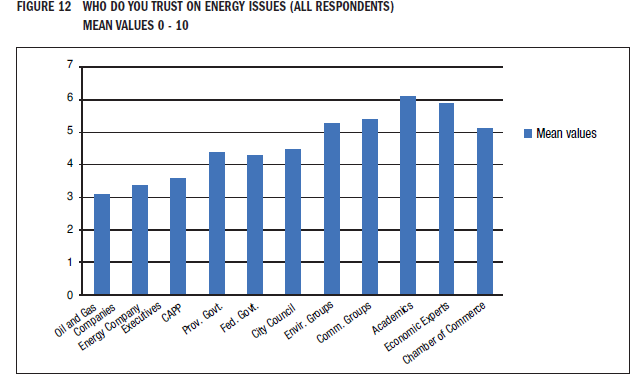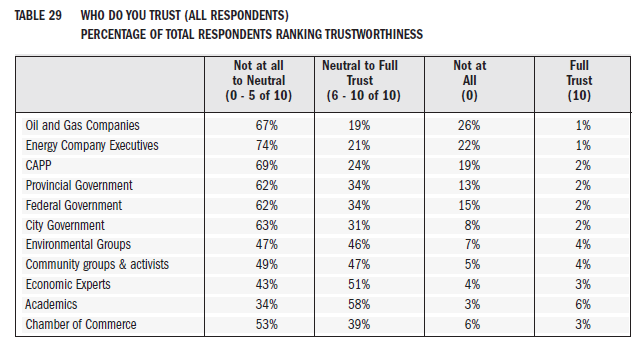Report: Energy Literacy in Canada by André Turcotte, Michal C. Moore, Jennifer Winter, Volume 5, Issue 32, October 2012, The School of Public Policy, University of Calgary
Concerns over the uncertainty of environmental impacts, the source of and/or the mitigation of those impacts are apparent in the range of answers. It is clear that a significant number of Canadians (32%) associate long-term health issues, including the future well being of the country, and a responsibility to ensure adequate levels of environmental quality for future generations (33%), with energy use. Lack of information or knowledge does not appear to be a major concern to respondents, suggesting that they believe themselves relatively aware of environmental problems associated with energy generation, such as climate change. …
Renewable technologies were more popular and more broadly supported than fossil fuel combustion, and produced higher support across all categories measured. …
VI. STRATEGIC IMPLICATIONS FOR ENERGY POLICY LEADERSHIP
The starting point for developing a comprehensive energy policy is to enlist the support of trusted spokespeople to convey the importance of the issue and explain the policy ramifications. In our study, we attempted to identify the individuals or groups most trusted (or not) by Canadians on matters related to energy. Overall, most stakeholders enjoy lukewarm credibility at best. Using a scale of zero to ten, where zero is “not at all trustworthy” and ten is “very trustworthy,” only academics (with a mean score of 6.13), economic experts (score: 5.59), community groups and activists (5.38) and environmental groups and activists (5.33) garner generally positive scores. At the other end of the scale, oil and gas companies (3.11), energy company executives (3.39) and CAPP, the Canadian Association of Petroleum Producers, (3.65) suffer from serious image problems.
Table 29 reinforces the perceptions of trustworthiness displayed in Figure 12. Oil and gas companies, energy executives and CAPP were seen to be not trustworthy at all by a significant number of respondents. Academics ranked highest in the full trust and relative trustworthiness categories.
… Although on average, Canadian residents are distributed widely across all provinces, survey results were dominated by urban (83%) versus rural (16%) respondents, including 22% of households with children under 12, 10% with one child and 12% with two or more. Those households with children aged 12 to 18 comprised 13% of the sample (87% of all households had no children in this category).
Video: Findings from a national survey on energy literacy in Canada released October 31, 2012 by The School of Public Policy, University of Calgary
The energy sector has a real credibility issue in terms of engaging in conversation about energy because people are not trusting them. In terms of trying to gauge the trustworthiness of sources, we asked on scale of zero to ten, how do you trust the series of institutions and people.
Experts and academics did really well…but more surprisingly, we have a cluster of institution and people that do reasonably well, but not as well as you expected. The provincial and federal government have some credibility, but not as much as you would expect. …
CAPP [The Canadian Association of Petroleum Producers], the oil and gas executives are doing poorly, they are in the low three’s. When you are at three, you’re sharing the bottom with lawyers and used car salesmen. ….what they are doing is not working. With that low level of credibility, people are just tuning them out.
National poll reveals low understanding by Canadians of major energy issues by The School of Public Policy, University of Calgary, October 31, 2012, Canada News Wire
The poll sampled 1,508 Canadians from coast to coast with a margin of error +/- 3.0 percent 19 times out of 20. In a report that outlines the survey results, Michal Moore, André Turcotte and Jennifer Winter explain that while a large majority of the Canadian public is worried about environmental issues arising from energy production….
…
Another important finding from the survey is that Canadians profess a low level of trust in certain groups when it comes to information about energy. The public shows less trust in energy companies and governments and more in academics and economic experts. Therefore, the authors argue, if Canada wishes to boost public understanding of important energy issues, using academics and economic experts as a source for information will offer a greater chance of success. [Emphasis added]
Oil And Gas Canada: Canadians Have Trust Issues With These Companies, A National Poll States by Bill Graveland, The Canadian Press, October 31, 2012, Huffingtonpost.ca
A University of Calgary survey gauging the energy literacy of Canadians places the industry on the same level of public trustworthiness as used car salesmen and lawyers, says one of the report’s authours. “The energy sector is losing the battle to the environmental groups and community groups that are perceived to be more trustworthy,” said Andre Turcotte, one of the authors of the survey done by The School of Public Policy at the University of Calgary. The online survey, done by the University of Calgary’s School of Public Policy, asked 1,508 Canadians a wide range of questions about energy. The respondents were asked to rank from one to ten how much they trusted the various sides in the energy industry on energy issues. The survey found that academics were considered the most trustworthy, with a score of 6.13 out of 10. Environmental groups and activists were at 5.33, while federal and provincial governments scored in the 4.3 range. Oil and gas companies rated at the bottom at 3.11. “If you get a rating of 3.1, you’re way down there in terms of credibility — you’re like with used-car salesmen and lawyers and others that people don’t really trust,” said Turcotte, an associate professor at Carleton University’s School of Journalism and Communication. “It’s also that people are tuning you out. No matter how much money you spend.”
Yedlin: Raising energy literacy is vital by Deborah Yedlin, November 3, 2012, Calgary Herald
That study, about energy literacy in Canada – or more accurately, the lack of energy literacy in this country – should make everyone in the energy sector very afraid. Canada is at a crossroads in terms of its energy development from a number of different perspectives: the need to build infrastructure to expand markets, the challenge faced by the industry in the context of earning and maintaining the social licence to operate and how best to treat and balance foreign direct investment.
…
The problem is that those with the most knowledge and understanding of the sector – oil and gas companies, their executives and yes, the Canadian Association of Petroleum Producers – have the least amount of credibility when it comes to being a trustworthy advocate for the industry. “The energy sector as a whole has a real credibility issue. They are not trusted as a source of information about energy and any move forward to increase literacy has to tackle the fact that as spokespeople they have problems,” said Turcotte.
Ouch.
On a scale of zero to 10, where zero is ‘least trustworthy,’ these three groups scored 3.1, 3.3 and 3.6, respectively. The next groups low on the credibility scale were federal and provincial politicians. Those with the highest credibility? Wait for it … academics. How that’s possible – with all due respect to academia – when academics don’t run businesses, is more than curious. … If the energy sector lacks credibility, who should speak for the industry? [Emphasis added]
[Refer also to: Hydraulic Fracturing and Water Resources A California Perspective ]

